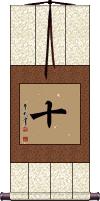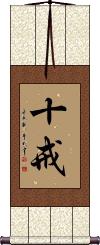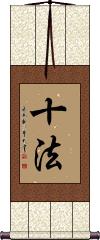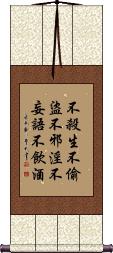Many custom options...
And formats...

Ten in Chinese / Japanese...
Buy a Ten calligraphy wall scroll here!
Personalize your custom “Ten” project by clicking the button next to your favorite “Ten” title below...
Ten
The number ten
十 is the number ten in Chinese, Japanese Kanji, and old Korean Hanja.
This is a strange selection for a wall scroll, so it's here mostly for reference. I guess it's OK if the number ten is important to you.
![]() Because this character is rather simple (just two strokes), there is an anti-fraud way to write ten on bank documents. This variant is shown to the right.
Because this character is rather simple (just two strokes), there is an anti-fraud way to write ten on bank documents. This variant is shown to the right.
Ten Commandments
十戒 means Ten Commandments or Ten Precepts.
In the Buddhist context, these are prohibitions consisting of five commandments for the layman:
1. Not to destroy life 不殺生 Pāṇātipātāveramaṇi.
2. Not to steal 不倫盜 Adinnādānāver.
3. Not to commit adultery 不婬慾 Abrahmacaryaver.
4. Not to lie 不妄語 Musāvādāver.
5. Not to take intoxicating liquor 不飮酒 Suramereyya-Majjapamādaṭṭhānāver.
The ten commandments for the monk are the preceding five plus:
6. Not to eat food outside of regulated hours 不非時食 Vikāla-Bhojanāver.
7. Not to use garlands or perfumes 不著華鬘好香塗身 Mālā- Gandha-Vilepana-Dhāraṇa-Maṇḍana-Vibhūṣanaṭṭhānā.
8. Not to sleep on high or broad beds (chastity) 不坐高廣大牀 Uccāsayanā-Mahāsayanā.
9. Not to take part in singing, dancing, musical or theatrical performances 不歌舞倡伎不往觀聽 Nacca-Gīta-Vādita-Visūkadassanāver.
10. To refrain from acquiring uncoined or coined gold, or silver, or jewels 不得捉錢金銀寶物 Jātarūpa-Rajata-Paṭīggahaṇāver.
These original Buddhist commandments date back to about 2500 years ago. The English definitions above are followed by Chinese characters and original Pali pronunciation.
Under the Māhayāna Buddhism, these ten commands for the monk were changed, to accord with the new environment of the monk, to the following: not to kill, not to steal, to avoid all unchastity, not to lie, not to slander, not to insult, not to chatter, not to covet, not to give way to anger, to harbor no skepticism.
Ten perfect Mahayana rules
十法 is the title of the ten perfect or perfecting Mahāyāna rules.
The order of rules is as follows:
1. right belief.
2. right conduct.
3. right spirit.
4. the joy of the bodhi mind.
5. joy in the dharma.
6. joy in meditation.
7. pursuing the correct dharma.
8. obedience to, or accordance with dharma.
9. departing from pride, desire, etc.
10. comprehending the inner teaching of Buddha and taking no pleasure in attaining such knowledge or noting the ignorance of others.
This title is only used in the context of Buddhism. Japanese and Chinese people who are not familiar with Buddhism will not recognize this title.
Five Precepts
不殺生不偷盜不邪淫不妄語不飲酒 is the full list of the five precepts of Buddhism in Chinese.
There are many ways to translate or express these.
The following is one basic way:
1. Do not kill/murder.
2. Do not steal.
3. Do not commit adultery and/or sexual misconduct.
4. Do not lie or speak falsehoods.
5. Do not become intoxicated (with drugs/alcohol).
Here is another take from my favorite magazine: Lion's Roar: Five Precepts
This in-stock artwork might be what you are looking for, and ships right away...
Gallery Price: $108.00
Your Price: $59.88
Not the results for ten that you were looking for?
Below are some entries from our dictionary that may match your ten search...
| Characters If shown, 2nd row is Simp. Chinese |
Pronunciation Romanization |
Simple Dictionary Definition |
仙 see styles |
xiān xian1 hsien hisa ひさ |
More info & calligraphy: Immortal(1) (See 仙人・1) hermit; wizard; (2) (See 仙術) wizardry; (personal name) Hisa 僊 ṛṣi, 哩始 an immortal. 仙人; 人仙 the genī, of whom there is a famous group of eight 八仙; an ascetic, a man of the hills, a hermit; the Buddha. The 楞嚴經 gives ten kinds of immortals, walkers on the earth, fliers, wanderers at will, into space, into the deva heavens, transforming themselves into any form, etc. The names of ten ṛṣis, who preceded Śākyamuni, the first being 闍提首那? Jatisena; there is also a list of sixty-eight 大仙 given in the 大孔雀咒經下 A classification of five is 天仙 deva genī, 神仙 spirit genī, 人仙 human genī, 地仙 earth, or cavern genī, and 鬼仙 ghost genī. |
力 see styles |
lì li4 li riki りき |
More info & calligraphy: Power / Strength(suffix) strength; power; proficiency; ability; (given name) Riki bala; power, strength, of which there are several categories: 二力 power of choice and of practice; 三力 the power of Buddha; of meditation (samādhi) and of practice. 五力 pañcabala, the five powers of faith, zeal, memory (or remembering), meditation, and wisdom. 六力 A child's power is in crying; a woman's in resentment; a king's in domineering; an arhat's in zeal (or progress); a Buddha's in mercy; and a bhikṣu's in endurance (of despite) . 十力 q.v. The ten powers of Buddhas and bodhisattvas. |
干 see styles |
gān gan1 kan motomu もとむ |
(bound form) to have to do with; to concern oneself with; one of the ten heavenly stems 天干[tian1 gan1]; (archaic) shield (irregular okurigana usage) (n,n-pref) drying; dried; (male given name) Motomu A shield; a stem, or pole; to offend; to concern; to seek. |
忍 see styles |
rěn ren3 jen nin にん |
More info & calligraphy: Patience / Perseverance(archaism) endurance; forbearance; patience; self-restraint; (given name) Nin kṣānti, 羼提 (or 羼底); patience, endurance, (a) in adverse circumstances, (b) in the religious state. There are groups of two, three, four, five, six, ten, and fourteen, indicating various forms of patience, equanimity, repression, forbearance, endurance, constancy, or "perseverance of the saints," both in mundane and spiritual things. |
斗 see styles |
dǒu dou3 tou hakaru はかる |
More info & calligraphy: Fight / Beat Someonekanji radical 68 at right; (given name) Hakaru A bushel, i. e. ten Chinese pints. |
辛 see styles |
xīn xin1 hsin shinkou / shinko しんこう |
More info & calligraphy: Sim(counter) (colloquialism) counter for spiciness of food (e.g. curry); (surname) Shinkou sharp |
五戒 see styles |
wǔ jiè wu3 jie4 wu chieh gokai ごかい |
More info & calligraphy: Five Preceptspañca-veramaṇī; the first five of the ten commandments, against killing, stealing, adultery, lying, and intoxicating liquors. 不殺生; 不偸盜; 不邪婬; 不妄語; 不飮酒 They are binding on laity, male and female, as well as on monks and nuns. The observance of these five ensures rebirth in the human realm. Each command has five spirits to guard its observer 五戒二十五神. |
十戒 see styles |
shí jiè shi2 jie4 shih chieh jukkai じゅっかい |
More info & calligraphy: Ten Commandments(1) (Buddhist term) the 10 precepts; (2) Ten Commandments; Decalogue; Decalog; (surname) Jukkai Śikṣāpada. The ten prohibitions (in Pāli form) consist of five commandments for the layman: (1) not to destroy life 不殺生 pāṇātipātāveramaṇi; (2) not to steal 不倫盜 adinnādānāver; (3) not to commit adultery 不婬慾 abrahmacaryaver.; (4) not to lie 不妄語musāvādāver.; (5) not to take intoxicating liquor 不飮酒 suramereyya-majjapamādaṭṭhānāver. Eight special commandments for laymen consist of the preceding five plus: (6) not to eat food out of regulated hours 不非時食 vikāla-bhojanāver.; (7) not to use garlands or perfumes 不著華鬘好香塗身 mālā- gandha-vilepana-dhāraṇa-maṇḍana-vibhūṣanaṭṭhānā; (8) not to sleep on high or broad beds (chastity) 不坐高廣大牀 uccāsayanā-mahāsayanā. The ten commandments for the monk are the preceding eight plus: (9) not to take part in singing, dancing, musical or theatrical performances, not to see or listen to such 不歌舞倡伎不往觀聽 nacca-gīta-vādita-visūkadassanāver.; (10) to refrain from acquiring uncoined or coined gold, or silver, or jewels 不得捉錢金銀寶物 jātarūpa-rajata-paṭīggahaṇāver. Under the Māhayāna these ten commands for the monk were changed, to accord with the new environment of the monk, to the following: not to kill, not to steal, to avoid all unchastity, not to lie, not to slander, not to insult, not to chatter, not to covet, not to give way to anger, to harbour no scepticism. |
十法 see styles |
shí fǎ shi2 fa3 shih fa jippō |
More info & calligraphy: Ten perfect Mahayana rules |
合十 see styles |
hé shí he2 shi2 ho shih gōjū |
More info & calligraphy: Namaste - Greeting合爪; 合掌 To bring the ten fingers or two palms together; a monk's salutation. |
大師 大师 see styles |
dà shī da4 shi1 ta shih daishi だいし |
More info & calligraphy: Grand Master / Great Teacher(honorific or respectful language) {Buddh} great teacher (i.e. a buddha, bodhisattva or high monk, esp. Kobo Daishi); (place-name) Daishi Great teacher, or leader, one of the ten titles of a Buddha. |
天佑 see styles |
tenyuu / tenyu てんゆう |
More info & calligraphy: Divine Grace |
日蓮 日莲 see styles |
rì lián ri4 lian2 jih lien nichiren にちれん |
More info & calligraphy: NichirenNichiren, the Japanese founder, in A. D. 1252, of the 日蓮宗 Nichiren sect, which is also known as the 法華宗 or Lotus sect. Its chief tenets are the three great mysteries 三大祕法, representing the trikāya: (1) 本尊 or chief object of worship, being the great maṇḍala of the worlds of the ten directions, or universe, i. e. the body or nirmāṇakāya of Buddha; (2) 題目 the title of the Lotus Sutra 妙法蓮華經 Myo-ho-ren-gwe-kyo, preceded by Namo, or, 'Adoration to the scripture of the lotus of the wonderful law, ' for it is Buddha's spiritual body; (3) 戒壇 the altar of the law, which is also the title of the Lotus as above; the believer, wherever he is, dwells in the Pure-land of calm light 寂光淨土, the saṃbhogakāya. |
無盡 无尽 see styles |
wú jìn wu2 jin4 wu chin mujin むじん |
More info & calligraphy: Endless / Without Limit(given name) Mujin Inexhaustible, without limit. It is a term applied by the 權教 to the noumenal or absolute; by the 實教 to the phenomenal, both being considered as infinite. The Huayan sūtra 十地品 has ten limitless things, the infinitude of living beings, of worlds, of space, of the dharmadhātu, of nirvāṇa, etc. |
ティン see styles |
tein / ten テイン |
thein; theine; caffeine; (personal name) Dain; Dane; Dein |
天力士 see styles |
tiān lì shì tian1 li4 shi4 t`ien li shih tien li shih ten rikishi |
More info & calligraphy: Warrior of Heaven |
千差萬別 千差万别 see styles |
qiān chā wàn bié qian1 cha1 wan4 bie2 ch`ien ch`a wan pieh chien cha wan pieh sensha manbetsu |
More info & calligraphy: Diversitya thousand differences and ten thousand distinctions |
鵬程萬里 鹏程万里 see styles |
péng chéng wàn lǐ peng2 cheng2 wan4 li3 p`eng ch`eng wan li peng cheng wan li |
More info & calligraphy: A Bright Future |
w see styles |
w w w |
(Internet slang) ten thousand (abbr. for 萬|万[wan4]) |
丈 see styles |
zhàng zhang4 chang masuo ますお |
measure of length, ten Chinese feet (3.3 m); to measure; husband; polite appellation for an older male (particle) (1) (kana only) only; just; merely; simply; no more than; nothing but; alone; (particle) (2) (kana only) as much as; to the extent of; enough to; (given name) Masuo Ten feet; an elder; a wife's parents; a husband. |
丙 see styles |
bǐng bing3 ping minezaki みねざき |
third of the ten Heavenly Stems 十天干[shi2 tian1 gan1]; third in order; letter "C" or Roman "III" in list "A, B, C", or "I, II, III" etc; ancient Chinese compass point: 165°; propyl (1) (へい only) (See 甲乙丙丁) third rank; third class; third person (in a contract, etc.); (2) (esp. ひのえ) third sign of the Chinese calendar; (personal name) Minezaki Fire, heat, south; the third of the ten stems. |
京 see styles |
jīng jing1 ching kyou(p); kei / kyo(p); ke きょう(P); けい |
capital city of a country; big; algebraic term for a large number (old); artificial mound (old) (1) (きょう only) imperial capital (esp. Kyoto); (2) (きょう only) (See 伊呂波歌) final word of an iroha poem; (numeric) (3) (usu. けい) 10^16; 10,000,000,000,000,000; ten quadrillion; (surname, female given name) Miyako capital |
什 see styles |
shí shi2 shih sousaku / sosaku そうさく |
ten (used in fractions, writing checks etc); assorted; miscellaneous (1) (See 十・1) 10; ten; (2) (archaism) book containing a collection of poems; (personal name) Sousaku A file of ten; sundry, what. |
傑 杰 see styles |
jié jie2 chieh ketsu けつ |
(bound form) hero; heroic; outstanding person; prominent; distinguished (counter) the top (e.g. top ten); the best; (given name) Masaru |
冓 see styles |
gòu gou4 kou |
inner rooms of palace; ten billions |
割 see styles |
gē ge1 ko wari わり |
to cut; to cut apart (n,n-suf) (1) rate; ratio; proportion; percentage; (2) profit; (3) assignment; (4) 10%; unit of ten percent; (5) (sumo) match; schedule of matches; (suffix noun) (6) diluted with (of drinks); mixed with; (place-name) Wari To cut, gash, sever. |
〸 see styles |
shí shi2 shih yokotate よこたて |
ten; 10 (numeric) ten (chi: shí); (personal name) Yokotate |
卍 see styles |
wàn wan4 wan manji まんじ |
swastika, a sacred and auspicious symbol in Hinduism, Buddhism, and Jainism swastika (esp. a counterclockwise swastika as a Buddhist symbol); fylfot; gammadion; (given name) Manji sauvastika, 塞縛悉底迦; also styled 室利靺瑳 śrīvatsa, lucky sign, Viṣṇu's breast-curl or mark, tr. by 海雲 sea-cloud, or cirrhus. Used as a fancy form of 萬 or 萬; and is also written in a form said to resemble a curl. It is the 4th of the auspicious signs in the footprint of Buddha, and is a mystic diagram of great antiquity. To be distinguished from 卐svastika, the crampons of which turn to the right. |
呉 see styles |
wú wu2 wu go ご |
Japanese variant of 吳|吴[Wu2] (1) Wu (region in China, south of the lower Yangtze); (2) (hist) Wu (kingdom in China during the Five Dynasties and Ten Kingdoms era; 902-937 CE); Southern Wu; (3) (hist) (See 三国・2) Wu (kingdom in China during the Three Kingdoms era; 222-280 CE); Eastern Wu; Sun Wu; (4) (hist) Wu (kingdom in China during the Spring and Autumn era; 11th century-473 BCE); (surname) Gou Wu |
囀 啭 see styles |
zhuàn zhuan4 chuan ten |
to sing (of birds or insects); to warble; to chirp; to twitter Translit. vā. |
Click here for more ten results from our dictionary
The following table may be helpful for those studying Chinese or Japanese...
| Title | Characters | Romaji (Romanized Japanese) | Various forms of Romanized Chinese | |
| Ten | 十 / 拾 十 | juu / ju | shí / shi2 / shi | shih |
| Ten Commandments | 十戒 | jukkai / jukai | shí jiè / shi2 jie4 / shi jie / shijie | shih chieh / shihchieh |
| Ten perfect Mahayana rules | 十法 | jippou / jipo | shí fǎ / shi2 fa3 / shi fa / shifa | shih fa / shihfa |
| Five Precepts | 不殺生不偷盜不邪淫不妄語不飲酒 不杀生不偷盗不邪淫不妄语不饮酒 | bù shā shēng bù tōu dào bù xié yín bù wàng yǔ bù yǐn jiǔ bu4 sha1 sheng1 bu4 tou1 dao4 bu4 xie2 yin2 bu4 wang4 yu3 bu4 yin3 jiu3 bu sha sheng bu tou dao bu xie yin bu wang yu bu yin jiu | pu sha sheng pu t`ou tao pu hsieh yin pu wang yü pu yin chiu pu sha sheng pu tou tao pu hsieh yin pu wang yü pu yin chiu |
|
| In some entries above you will see that characters have different versions above and below a line. In these cases, the characters above the line are Traditional Chinese, while the ones below are Simplified Chinese. | ||||
Successful Chinese Character and Japanese Kanji calligraphy searches within the last few hours...








